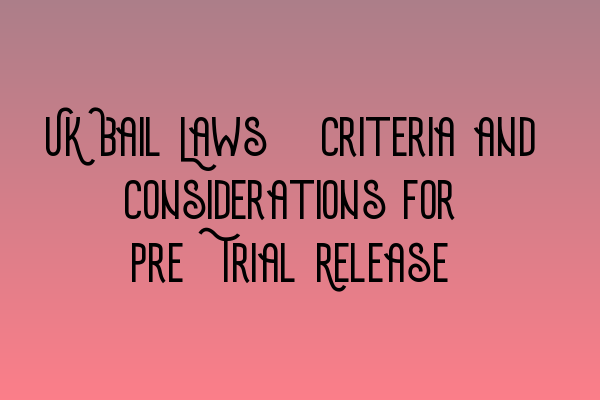UK Bail Laws: Criteria and Considerations for Pre-Trial Release
When facing criminal charges in the UK, being granted bail while awaiting trial is an important aspect of the justice system. Bail allows individuals to remain free until their trial date and prepares them for their defense. However, the decision to grant bail is not taken lightly and is based on various criteria and considerations.
The Criteria for Bail
UK bail laws adhere to specific criteria that must be met in order for an individual to be granted pre-trial release. These criteria include:
- Flight Risk: The court carefully assesses whether the individual poses a risk of fleeing the jurisdiction, considering factors such as ties to the community, immigration status, and previous instances of skipping bail.
- Potential Danger: Any potential harm or danger the individual may pose to the public or specific individuals involved in the case is taken into account.
- Criminal Record: The defendant’s criminal record, including any previous convictions, pending charges, or breaches of bail conditions, is examined to determine their likelihood of reoffending while on bail.
- Witness Intimidation: If there is a risk of witness intimidation or interference with the case, the court may be more reluctant to grant bail.
- Community Support: Provisions such as the availability of suitable accommodation, employment, or support from family and friends can play a role in demonstrating community ties and stability.
Considerations for Pre-Trial Release
In addition to the criteria mentioned above, the court will consider certain factors when making a decision regarding bail:
- Nature and Severity of the Crime: Courts often take into account the seriousness of the charges and the potential sentence faced by the individual. More serious offenses may make it more difficult to obtain bail.
- Evidence and Case Strength: The strength of the evidence against the defendant and the likelihood of conviction may influence the court’s decision. A strong case against the individual may decrease their chances of being granted bail.
- Previous Bail History: If the individual has a history of breaching bail conditions or failing to appear in court, it can significantly impact their ability to secure pre-trial release.
- Mental Health and Vulnerability: The court takes into account any mental health issues or vulnerabilities the individual may have, ensuring that appropriate care and support are available if bail is granted.
It is essential to note that each case is unique, and the decision regarding bail ultimately lies in the hands of the court. Adequate legal representation is crucial to present a strong case for bail and address any concerns raised by the prosecution.
Conclusion
Understanding the criteria and considerations involved in the UK bail process is crucial for individuals facing criminal charges. By meeting the necessary criteria and presenting compelling arguments, the chances of being granted pre-trial release can be significantly enhanced.
If you want to learn more about the UK legal system and how to prepare for the SQE exams, check out these related articles:
